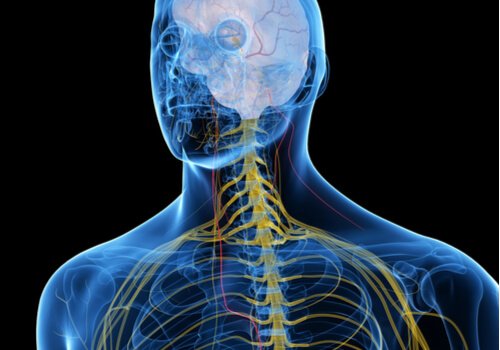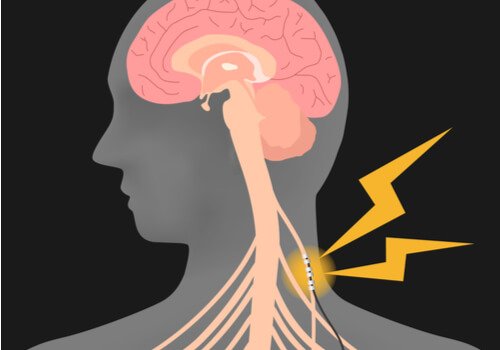Stimulating the Vagus Nerve Improves Overall Health

The vagus nerve is the longest and most complex nerve in the entire body. It connects the brain to many important organs including the intestines, stomach, heart, and lungs.
The vagus nerve is also a key part of the parasympathetic nervous system and influences breathing, digestion, and heart rate. It also has an influence on mental health. Therefore, optimizing the functioning of the vagus nerve can improve our health and strengthen our defenses against stress.
An increase in the vagal tone activates the parasympathetic nervous system. Having a high vagal tone means that the body can relax in a shorter amount of time after being under stress.
In fact, in the year 2010, researchers discovered a positive feedback loop between a superior vagal tone, positive emotions, and good physical health. In other words, the more you increase your vagal tone, the more your physical and mental health will improve, and vice-versa.
The role of the vagus nerve in the relaxation response
The vagus nerve has many different functions. Some of the most important ones are related to its role as the main component of the autonomic nervous system. This system controls involuntary bodily functions such as heart rate, digestion, and breathing.
The autonomic nervous system is divided into two main branches: the sympathetic and the parasympathetic nervous system. The sympathetic nervous system prepares the body to deal with perceived danger in a stressful and hazardous situation.
On the other hand, the parasympathetic nervous system prepares the body for rest and relaxation. This relaxed state should be our default state. However, this isn’t the case for most people who suffer from anxiety and high stress levels.

In addition to initiating the relaxation response, the vagus nerve also influences the reduction of inflammation, memory storage, and homeostasis. It also activates the production of many important neurotransmitters such as GABA, norepinephrine, and acetylcholine.
Signs and symptoms of vagus nerve dysfunction
Our overall health and the functioning of the vagus nerve are closely related to the vagal tone. When the vagus nerve functions as it should, it keeps a high vagal tone, which is related to good physical health, mental well-being, and resistance to stress.
When the vagus nerve isn’t functioning as it should, it keeps a low vagal tone. More often than not, people who get stressed really easily and have trouble calming down after experiencing stress have a low vagal tone.
Since one of the many functions of the vagus nerve is to act as a switch for inflammation, having a low vagal tone might lead to chronic inflammation, an important factor in many diseases such as ADHD, anxiety, depression, Alzheimer’s, heart disease, cancer, and diabetes. Additionally, a low vagal tone has been linked to a long list of physical and mental health conditions.
The vagal tone affects many important systems. Here are some of the symptoms and disorders related to a low vagal tone:
- Constipation.
- Depression.
- Diabetes.
- Anxiety disorders.
- Autoimmune disorders.
- Bipolar disorder.
- Difficulty swallowing.
- Tendency to choke while eating.
- Digestive disorders including gastroparesis.
- Hoarseness.
- Migraines.
- Obesity.
- Rheumatoid arthritis.
- Sudden drops in blood pressure.
- Heart diseases, including slow heart rate.
- Alzheimer’s disease.
- Chronic fatigue syndrome.
- Epilepsy.
Keys to help stimulate the vagus nerve
There are many different ways to stimulate the vagus nerve in order to maintain a healthy and high vagal tone. Researchers prefer to use the term vagus nerve stimulation. In reality, what stimulates the vagus nerve is actually what strengthens and tones it, just as exercise tones and strengthens the muscles.
A healthier vagus nerve is more receptive. Having a healthy vagus nerve will help you recover from stress more quickly.

Stimulating the vagus nerve using the mind-body connection
Here are some exercises and mind-body therapies that can help stimulate the vagus nerve:
- Singing: Singing by yourself or with other people can help stimulate the vagus nerve, according to research. When you sing with other people, your heart rate is synchronized. It’s believed that the vagus nerve is responsible for this.
- Meditating: One study found that meditating automatically increased the vagal tone. In addition, researchers discovered that the Om chant increases the vagal tone and reduces activity in the amygdala, the brain’s fear center.
- Doing yoga: Moderate exercise of any kind can stimulate the vagus nerve. However, yoga is the one that stands out the most out of all of them. Numerous studies support the fact that yoga increases the parasympathetic activity of the nervous system which, in turn, improves the vagal tone. For example, one study found that yoga not only improves the vagal tone, but it also increases the release of GABA, the neurotransmitter of relaxation.
- Acupuncture: This strengthens the vagal tone. Traditional acupuncture, particularly auricular acupuncture, stimulates the vagus nerve.
- Reflexology: According to research, foot reflexology increases the vagal tone.
Other ways of stimulating the vagus nerve
Maintaining healthy relationships is another key to keeping the vagus nerve healthy. In fact, some say that people with a high vagal tone are more altruistic and have overall better relationships.
This is partly due to the fact that vagal stimulation causes the release of oxytocin. This is a hormone that’s commonly called a “connecting molecule” since it promotes union. Oxytocin is linked to human traits such as loyalty, empathy, trust, and courage.
Many studies state that there’s a positive feedback loop between uplifting social connections, positive emotions, and physical health set in motion by the vagal tone.

Therefore, one way of stimulating this nerve is to meet with friends you can laugh and have a good time with. Laughter strengthens relationships and increases the variability of heart rate. This is a reliable indicator that the vagus nerve is healthy.
Lastly, it’s worth mentioning that certain supplements can also help stimulate the vagus nerve. The reason for this is that they can actually improve its functioning. Some of them are ginger root, probiotics (specifically Lactobacillus rhamnosus), essential fatty acids with Omega-3 like DHA, and zinc.
This text is provided for informational purposes only and does not replace consultation with a professional. If in doubt, consult your specialist.








